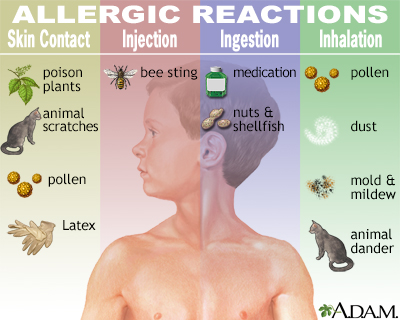| Step 1: What is an allergy? |
When most people think of an allergy, they think of the sneezing, congestion, and itchy eyes caused by pollen. In fact, allergies can be caused by just about any substance that you inhale or swallow, or that touches your skin. You can also be allergic to shots.
Your body's immune system is designed to attack harmful substances like bacteria and viruses. These reactions are important because they fight infections. But when you are allergic to something, your body develops allergic antibodies (IgE) against it. Your body develops IgE to things you normally come in contact with, such as pollen, pet hair, mold, and dust mites. Most people tolerate these substances without problems. When you have an IgE antibody to something, however, your immune system over reacts. These allergic reactions (hypersensitivity) can be uncomfortable and sometimes dangerous.

Allergies are extremely common, and they are on the rise. Already, about 50 million Americans suffer from allergies, leading to a lot of missed work and school days each year. Annual medical costs already exceed $4.5 billion.
Not only do allergies cause a range of annoying symptoms, such as sneezing and itchy eyes, but they can aggravate or trigger other conditions such as asthma, sinusitis, and ear infections. For example, when allergies cause inflammation in your nasal passages, the opening to your sinuses can become blocked, leading to sinus inflammation, sinus infections, and sinus pain. Similarly, allergies can cause the ears not to drain properly, which can lead to ear infections.

Allergies can cause different skin-related symptoms, such as hives, swelling, and eczema. Some types of allergies (often food allergies) can lead to nausea, vomiting, and diarrhea.
One of the most deadly kinds of allergic reaction is called "anaphylaxis." This is when the entire body has a swift, severe reaction to something such as foods (peanuts, tree nuts, fish, shellfish), latex, medications (penicillin), or insect stings. If anaphylaxis is not treated quickly, the body can go into shock, with a large drop in blood pressure, difficulty breathing, and possible heart failure and death.
To continue to the next step of the allergy guide, click "next" below.
References
Brozek JL, Bousquet J, Baena-Cagnani CE, et al. Allergic rhinitis and its impact on asthma (ARIA) guidelines: 2010 revision..J Allergy Clinical Immunology. Sept 2010:126(3);466-76.
Meltzer EO, Bukstein DA. The economic impact of allergic rhinitis and current guidelines for treatment. Annals of Allergy and Asthma. Feb 2011:106(2);Suppl 1:S12-16.
What is an Allergic Reaction? American Academy of Allergy, Asthma, and Immunology, Public Education Committee;2006.
Reviewed By: Paula J. Busse, MD, Assistant Professor of Medicine, Division of Clinical Immunology, Mount Sinai School of Medicine, New York, NY, Review provided by VeriMed Healthcare Network. Also reviewed by David Zieve, MD, MHA, Medical Director, A.D.A.M., Inc.
